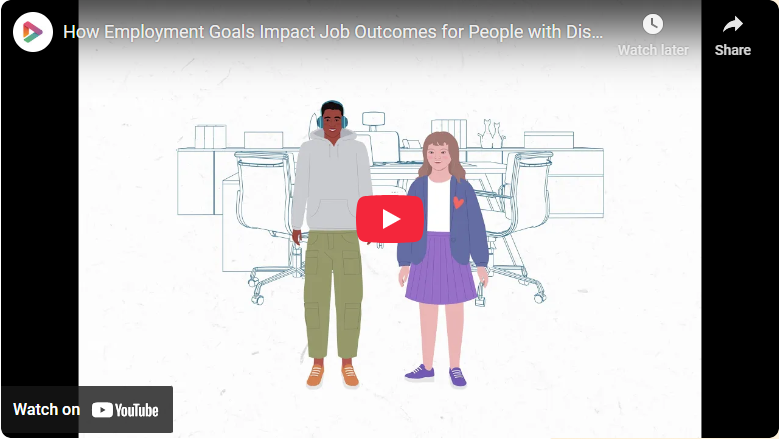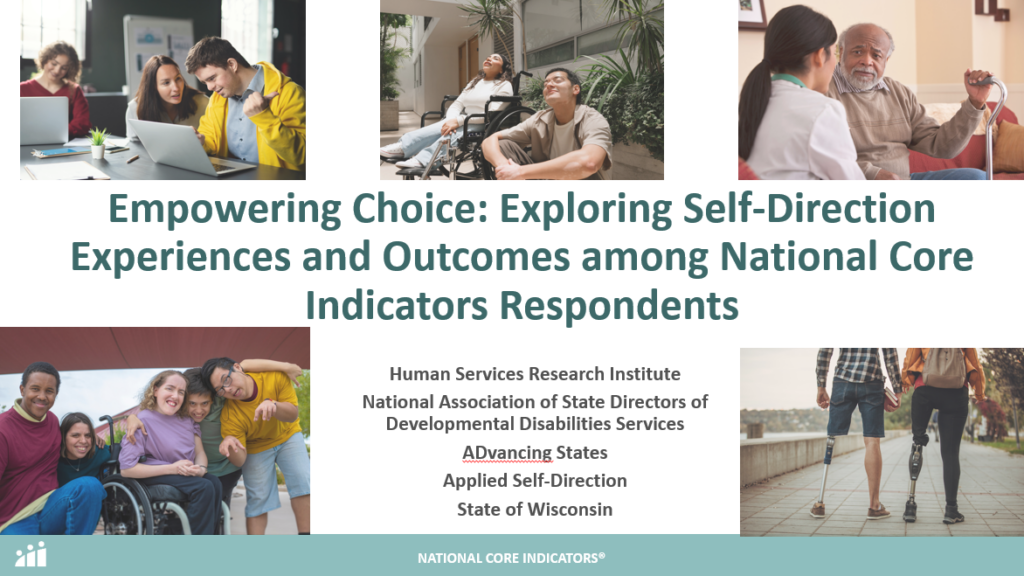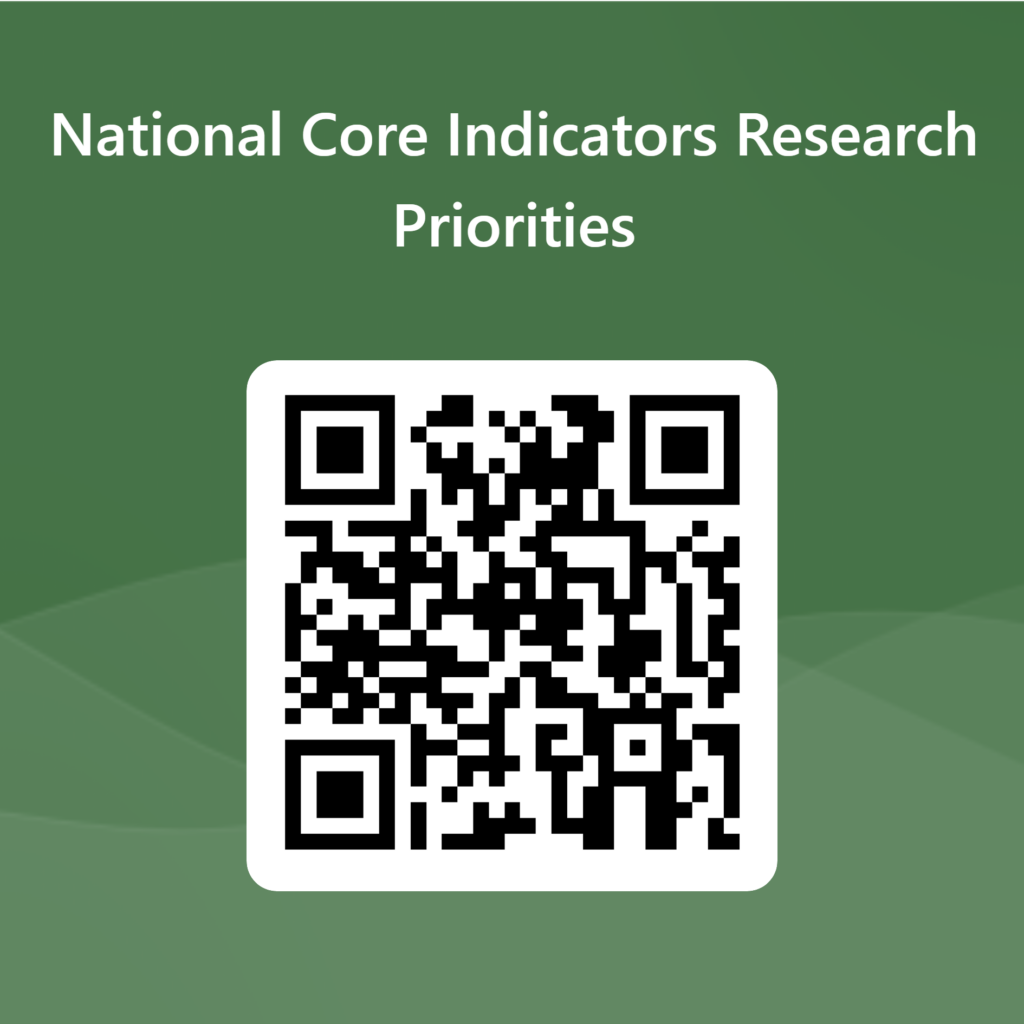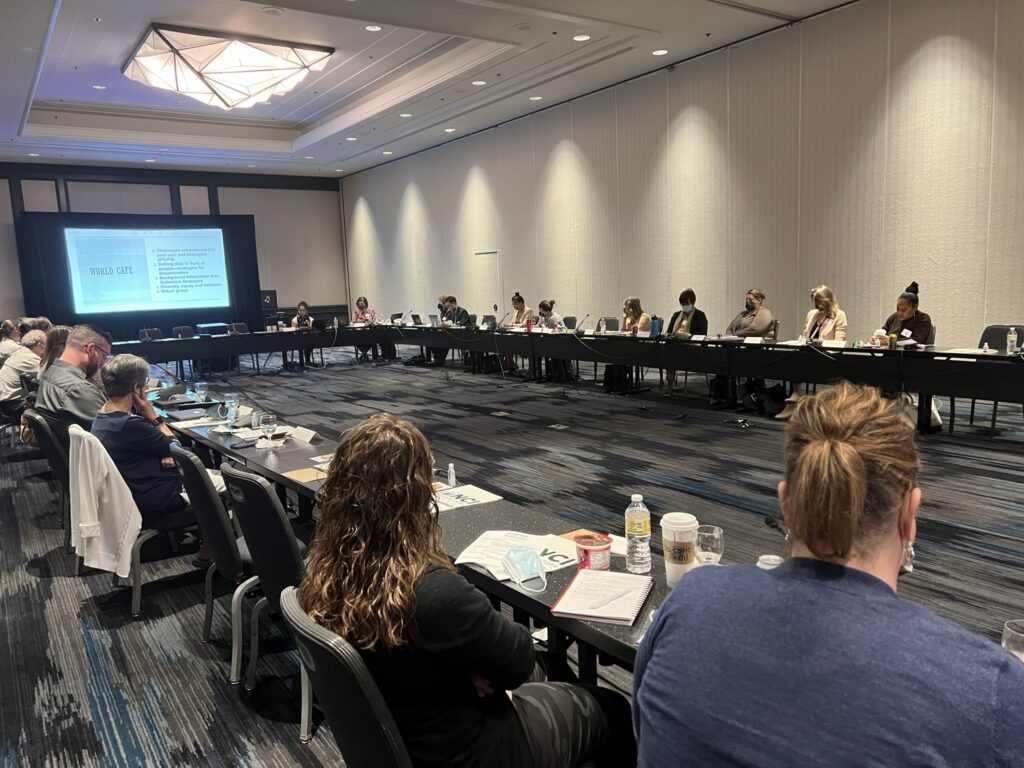What’s New
National Core Indicators Newsletter
National Core Indicators releases updates about our reports, resources, webinars, and more through a quarterly newsletter. Sign up today so you don’t miss any news, and use the links below to check out the previous issues.
NCI presents at TASH
The NCI team presented data at two sessions at the 2025 TASH meeting.
The first session was a 2 hour workshop looking at how we might be able to use NCI data in contrast to population data to describe health disparities. The slides can be found here.
The second session was a 1 hour breakout looking at data on dignity of risk. Please email us if you’d like to see a copy of those slides.
NCI-IDD Webinar on Employment
The NCI team celebrated National Disability Employment Awareness Month (NDEAM) by presenting a webinar called “From Data to Dignity: Advancing Employment for People with IDD.” This webinar showcased the latest data from National Core Indicators-Intellectual and Developmental Disabilities In Person Survey on employment among people with intellectual and developmental disabilities. The session will examine not only how many people with IDD are working in the community, but also will spotlight what we know about wages, hours, and weekly activities. Ultimately, these data highlight progress towards employment, and what needs to change in order to promote competitive integrated employment for people with IDD.
The webinar recording can be found here!
NCI-IDD Annual Meeting (Sep 24-25, 2025)
Representatives from several states came together in Savannah, GA on September 24-25 for the NCI-IDD Annual Meeting. Attendees, both in-person and virtual, shared knowledge, discussed accomplishments and challenges and learned about NCI-IDD across the country. If you were there, thanks for joining!
ANCOR Webinar featuring NCI data
Data and new research are critical tools in addressing the key challenges facing our workforce. Chronic instability in the Direct Support Professional (DSP) workforce disrupts continuity, predictability, and trust for people with I/DD. The DSP workforce often faces challenges related to poverty that go undiscussed. This webinar shared insights from several research projects, including NCI-IDD State of the Workforce data, to explore how systemic barriers—both inside and outside the workplace—impact DSPs and threaten the sustainability of services.
Access the video by clicking on the image below!

SciTube video on NCI-IDD employment data



HSRI partnered with SciTube to create a video based on recent research with NCI-IDD employment data. The video highlights key takeaways about employment among people with IDD, with emphasis on the transformative power of including person-centered employment goals in enhancing employment outcomes. The video is intended to be a more accessible product to describe the findings of the research article to various partners, so please feel free to share it widely!
NCI at the AAIDD Conference 2025
NCI team members attended the 2025 AAIDD conference in Washington DC on June 24-25, 2025.
We even shared some NCI data.
- POSTER: People with Co-Occurring IDD and Mental Health Conditions: Diagnoses, Treatment, and Outcomes
- PRESENTATION: Direct Support Professional Workforce and Turnover: Does Size Matter?
- PRESENTATION: Above and beyond: The lives and careers of DSPs and how to support them
- PRESENTATION: Where the Rubber Meets the Road: Person-centered Planning, Practices and Outcomes for HCBS Users
NCI State of the Workforce for Aging and Disabilities (AD) 2023 Report
We are thrilled to release the NCI State of the Workforce for Aging and Disabilities 2023 Survey Report. A total of six (6) states (Colorado, Illinois, Indiana, Missouri, Oregon, and Wisconsin) participated in the 2023 NCI State of the Workforce Survey for NCI-AD. All told, the responses from 1,232 provider agencies are included in this report. The data presented in this report refer to the period between Jan. 1 and Dec. 31, 2023.
National Core Indicators and Self-Direction: What Do the Data Show?
This brief examines data from National Core Indicators Intellectual and Developmental Disabilities (NCI-IDD) In-Person Survey (IPS) and National Core Indicators Aging and Disabilities (NCI-AD) Adult Consumer Survey (ACS) to shed light on the populations of people self-directing their supports and their experience of self-direction. These two self-direction data sets show that there are notable differences both among each survey population and between NCI-AD and NCI-IDD respondents. These include differences in demographics (e.g., diagnosis, race and ethnicity, level of disability) of those who use self-direction and differences in their experience of self-direction. The experiential differences also vary by personal characteristics, such as mode of communication and age. This brief concludes with recommendations for public managers as they consider how to expand service users’ access to self-direction.
Update on NCI Measures: HCBS QMS Workgroup
Update on the results of the Meeting to Review Measures for the 2028 HCBS Quality Measure Set (QMS) that took place April 8-9. Thank you so much to those who participated on the workgroup, those who shared public comment, and those who listened in.
The NCI team is thankful for the thoughtfulness of the workgroup.
As a reminder, the recommendations from the group are advisory only and CMS will determine whether to adopt the workgroup’s recommendations for the QMS revisions in 2028. Those measures currently in the QMS (see attached) that were not identified for removal will most likely remain in the QMS in 2028. For more info on the QMS, see here.
The following voting outcomes are for NCI-AD and NCI-IDD measures:
| Domain: Choice and Control | Voting Outcomes |
| Addition NCI-AD: Percentage of People in Group Settings Who Are Able to Choose Their Roommate | Voted to be added |
| Addition NCI-AD: Percentage of People in Group Settings Who Are Able to Furnish and Decorate Their Room However They Want To | Voted to be added |
| Addition NCI-AD: Percentage of People in Group Settings Who Are Able to Lock the Door to Their Room | Did not meet vote threshold for addition |
| Addition NCI-IDD: The Percentage of People who Report That There Are Rules About Having Friends or Visitors at Home | Did not meet vote threshold for addition |
| Addition NCI-IDD: The Percentage of People Reported to Be Using a Self-Directed Supports Option | Did not meet vote threshold for addition |
| Addition NCI-IDD: The Percentage of People who Report Staff Do Things the Way They Want Them Done | Did not meet vote threshold for addition |
| Addition NCI-IDD: The Percentage of People Who Report That They Know Whom to Talk to if They Want to Change Services | Voted to be added |
| Domain: Service Delivery and Effectiveness | |
| Removal NCI-AD: Percentage of People Who Had Adequate Follow-Up After Being Discharged from a Hospital or Rehabilitation/Nursing Facility | Voted NOT to remove |
| Addition NCI-AD: Percentage of People Who Know Whom to Contact if They Have a Complaint About Their Services | Voted NOT to remove |
| Domain: Community Inclusion | |
| Removal NCI-AD: Percentage of People Who Are Able To See or Talk To Their Friends and Family When They Want To | Voted NOT to remove |
| Removal NCI-AD: Percentage of Non-English Speaking Participants Who Receive Information About Their Services in the Language They Prefer | Voted NOT to remove |
| Domain: Holistic Health and Functioning | |
| Removal NCI-AD: Percentage of People With Concerns About Falling Who Had Someone Work With Them to Reduce Risk of Falls | Voted NOT to remove |
| Removal NCI-AD: Percentage of People Who Know How to Manage Their Chronic Conditions | Voted NOT to remove |
| Addition NCI-AD: Percentage of People Who Have Access to Mental Health Services if They Want Them | Voted to be added |
| Addition NCI-AD: Percentage of People Who Can Get an Appointment to See or Talk to Their Primary Care Doctor When They Need To | Did not meet vote threshold for addition |
| Addition NCI-AD: Percentage of People Who Have Needed Assistive Equipment and Devices | Voted to be added |
| Domain: Human and Legal Rights | |
| Removal NCI-AD: Percentage of People Who Are Ever Worried for the Security of Their Personal Belongings | Voted NOT to remove |
| Removal NCI-AD: Percentage of People Who Feel Safe Around Their Support Staff | Voted NOT to remove |
| Removal NCI-AD: Percentage of People Whose Money Was Taken or Used Without Their Permission in the Last 12 Months | Voted NOT to remove |
| Addition NCI-AD: Percentage of People in Group Settings Who Always Have Access to Food | Did not meet vote threshold for addition |
ODESA 2.0
NCI is excited to announce the launch of the improved ODESA 2.0 platform this summer.
ODESA 2.0 will be used to collect and store NCI survey data.
While the new system retains many features of the current data collection system, ODESA 2.0 will offer:
- A refreshed design
- New features
- Enhanced security
This new platform will be used to collect and submit data for the following surveys in the 2025-26 data cycle:
- NCI-IDD In Person Survey (IPS) and
- NCI-IDD family surveys (AFS, FGS, CFS)
- NCI-AD Adult Consumer Survey
Stay tuned for more information on ODESA 2.0!
Sarah Taub 2025 Webinar
The 2025 Sarah Taub Memorial NCI Webinar – Empowering Choice: Exploring Self-Direction Experience and Outcomes among National Core Indicators Respondents – was presented on January 29, 2025.
National Core Indicators (NCI) is the most comprehensive and representative source of data on the characteristics and outcomes of people with disabilities and older adults who use long-term services and supports (LTSS). In 2022-2023, NCI surveyed over 40,000 older adults and people with disabilities using state-funded long-term services and supports. Our team was joined by panelists from Applied Self Direction and state partners to showcase data that explores choice and control, with a focus on self-direction data and the outcomes and experiences of those self-directing their services who participate in both the NCI-IDD and NCI-AD surveys.
The findings shared in this webinar can improve understanding of where there are gaps in access to and quality of supports for self-direction, and can be used to inform LTSS policy and practice.
Click the image below to view the recording on YouTube, or click the links below to access slides, transcripts, and more.



HCBS QMS Updates – MFP Grant Note
On October 21, 2024, the Centers for Medicare & Medicaid Services (CMS) released a grant note to inform Money Follows the Person (MFP) demonstration grant recipients about updates to the Home and Community-Based Services (HCBS) Quality Measure Set (QMS) reporting requirements for the MFP demonstration program.
Specifically, the purpose of this grant note is to provide the list of mandatory experience of care survey measures for reporting in 2026 and to provide MFP grant recipients with additional flexibility on the timing of experience of care surveys.
Of note, please see the following updates included in the attachment:
- Mandatory measures are listed (both Experience of Care survey measures and Administrative measures)
- Performance period is amended for Experience of Care survey measures, so that those who use NCI-IDD or NCI-AD may report 2024-2025 or 2025-2026 data
- Allows staggering of surveys (for example, a state may wish to implement NCI-IDD in 2024-2025, and NCI- AD in 2025-2026 or vice versa)
- Clarification on allowable costs for MFP funding to support implementation and use of HCBS QMS
Note: States are now beginning to understand the scope of these expectations. CMS has indicated that MFP Grantee states may submit additional supplemental budget requests as needed as this fuller understanding might reveal additional needs for financing.
Please email Dorothy (dhiersteiner@hsri.org) if you have questions or want to discuss further.
NCI-IDD 2024 Annual Meeting
On September 18-19, representatives from about 25 states gathered in Baltimore, MD for the NCI-IDD 2024 Annual Meeting. This year’s agenda was packed with presentations about topics such as the Access Rule, Using NCI-IDD Data for Quality Improvement, Sharing Data with Interested Parties, Background Information, Recruitment and Retention of Surveyors, Sharing Data with State Partners, Creating a Person-Centered Survey Space, and Peer Surveying. See the slides below!
INFO FOR MFP STATES
Is your state a Money Follows the Person (MFP) grantee state? There are 41 states and territories that are MFP grantees. It is likely that your state is an MFP grantee state.
Why does it matter? A CMCS Informational Bulletin issued on April 11, 2024 describes new Home and Community Based (HCBS) Quality Measure Set (QMS) reporting requirements for MFP Demonstration Grant recipients.
Which HCBS funded programs in my state are impacted by this requirement? To meet the mandatory reporting requirement, MFP grant states must report on a subset of the measures from the HCBS QMS for a sample of people receiving services from ALL Medicaid-funded HCBS under section 1915(c), (i), (j), and (k) authorities as well as section 1115 demonstrations that include HCBS
This requirement applies to all enrollees in the above-mentioned waivers regardless of participation in MFP. For example, if a state operates three (3) 1915(c) waivers and only one waiver has enrollees who accessed MFP funds, all 3 1915(c) waivers must meet the QMS reporting requirement. To reiterate, This requirement applies to all waivers (1915(c), (i), (j), and (k) authorities and 1115 waiver HCBS) and waiver enrollees in MFP states, not just enrollees who have received MFP funding.
For quality measures that allow for a statistically valid representative sample, states are not expected to survey all HCBS service recipients. States can design a sample to survey from their HCBS population so as to be able to report on the HCBS population as a whole. Because this requirement applies to all waiver enrollees in MFP states, there is no need to separate MFP recipients from the general waiver population for QMS sampling purposes.
For example, for the measures in the QMS that come from NCI-IDD In Person Survey (which allows for a statistically valid representative sample), states’ sampling methodologies do not need to change from previous years.
What measures are included in the HCBS QMS for MFP grantee states?
The Experience of Care Measures, (NCI-IDD, NCI-AD, POM and CAHPS), are only one of the five measures in the mandatory HCBS QMS
Experience of care survey(s) for each major population groups included in the States HCBS’s programs (specific measures to be determined) –states may use NCI-IDD, NCI-AD, CAHPS, and/or POM
MLTSS-1 and FFS-1: Comprehensive Assessment and Update
The number of Medicaid HCBS participants who had either of the following:
New participants: An LTSS comprehensive assessment, completed within 90 days of enrollment, containing all 10 core elements documented;
Established participants: An LTSS comprehensive assessment, completed at least once during the measurement year, containing all 10 core elements documented.
MLTSS-2 and FFS-2: Comprehensive Person-Centered Plan and Update
The percentage of Medicaid HCBS participants who had an LTSS comprehensive person-centered plan with 10 core elements documented within 120 days of enrollment (for new participants) or during the measurement year (for established participants).
The percentage of Medicaid HCBS participants who had an LTSS comprehensive person-centered plan with 10 core elements and at least 4 supplemental elements documented within 120 days of enrollment (for new participants) or during the measurement year (for established participants).
MLTSS- 6 and FFS-6: Admission to a Facility from the Community
The number of admissions to a facility among Medicaid MLTSS participants, aged 18 years and older, residing in the community for at least one month.
The number of short-term, medium-term, or long-term admissions is reported, per 1,000 participant months. Participant months reflect the total months each participant is enrolled in the program and residing in the community for at least one day of the month.
MLTSS-7 and FFS-7: Minimizing Facility Length of Stay
The proportion of admissions to a facility among Medicaid FFS LTSS participants, aged 18 years and older, that result in successful discharge to the community (community residence for 60 or more days) within 100 days of admission.
MLTSS-8 and FFS-8: Successful Transition after Long-Term Facility Stay
The proportion of long-term facility stays among Medicaid FFS LTSS participants, aged 18 years and older, that result in successful transitions to the community (community residence for 60 or more days).
For additional information regarding FFS -1 and FFS-2 core and supplemental elements and other mandatory measures in the HCBS QMS, please refer to the Long-Term Services and Supports (LTSS) Quality Measures Technical Specifications and Resource Manual.
For the Experience of Care Survey portion, what surveys should my state use?
States can use the survey(s) of their choice to collect and report HCBS QMS data for all of their HCBS populations.
For example:
States can use the applicable NCI®-IDD measures in the measure set to demonstrate outcomes for adults receiving services through the state DD system.
States can use the applicable NCI-AD ™ measures in the measure set to demonstrate outcomes for older adult and persons with physical disabilities receiving services through the State Aging and Physical Disabilities System.
When and how will states report these data to CMS?
The data will be submitted to CMS by September, 2026.
For states using NCI-IDD and NCI-AD for the Experience of Care Survey portion, survey administration will occur during the 2024-25 data cycle to meet this date.
Upon approval from designated state representatives, the NCI-IDD and NCI-AD teams will submit the applicable data to CMS on the behalf of states.
If my state is an MFP state and already participates in NCI-IDD In Person Survey, what do I need to do?
If your state is participating in the NCI-IDD IPS for the 2024-25 data cycle, and your state’s NCI-IDD IPS sample includes all HCBS programs in your state that are administered by the DD system, you do not need to do anything more for the experience of care measures addressing the waivers within the DD system.
We recommend connecting with your MFP coordinator to discuss the state’s plans for reporting for all HCBS programs and ensure that the MFP coordinator is aware of the reporting requirements.
What are the NCI-IDD In Person Survey measures included in the QMS?
This document demonstrates the 2022-23 NCI-IDD IPS data on the NCI-IDD IPS measures that are currently included in the QMS. https://idd.nationalcoreindicators.org/wp-content/uploads/2024/07/NCI-IDD-IPS-22-23-HCBS-quality-measure-set.pdf
IMPORTANT: The data included in this PDF include people who do not receive HCBS. When future data are reported to CMS for purposes of the HCBS Quality Measure Set, the data will only include those receiving HCBS.
How is this requirement related to the Access Rule?
This requirement will be expanded to non-MFP states for reporting in 2028.
If you have any questions or need further assistance please do not hesitate to reach out to Laura Vegas at lvegas@nasddds.org or Dorothy Hiersteiner dhiersteiner@hsri.org
Money Follows The Person and the HCBS Quality Measure Set
The Centers for Medicare & Medicaid Services (CMS) recently issued guidance to Money Follows the Person (MFP) state grantees on requirements to report quality measures from the CMS home and community-based services (HCBS) quality measure set. Starting in 2026, these requirements will apply to all HCBS waivers that MFP grantee states operate (1915(c), 1915(i), 1915(j), 1915(k), and 1115 waivers).
While the subset of measures to be reported is still in development, CMS confirms that experience-of-care data from the HCBS Quality Measure Set will be included. The HCBS Quality Measure Set includes several National Core Indicators (NCI®) measures related to health, choice, access, person-centered planning, and more. These measures come from one or more of four approved surveys, including the National Core Indicators Intellectual and Developmental Disabilities (NCI®-IDD) In-Person Survey and the National Core Indicators Aging and Disability (NCI-AD™) Adult Consumer Survey.
The NCI team—which includes expert personnel from National Association of State Directors of Developmental
Disabilities Services (NASDDDS), ADvancing States, and Human Services Research Institute (HSRI)— is well positioned to support states to meet MFP quality reporting requirements. The team is in regular communication with CMS and is following closely the anticipated quality requirements in the forthcoming HCBS Access Rule.
In this fact sheet you will find more information on NCI® as a solution for addressing CMS requirements.
NASDDDS Member Education Webinar: NCI State of the Workforce®-IDD and Using Data to Inform Solutions
The National Association of State Directors of Developmental Disabilities Services (NASDDDS) and the Human Services Research Institute (HSRI) recently released the NCI State of the Workforce ®-IDD 2022 Survey Report. This webinar, held on March 21, 2024, discussed the survey and how it works and showed the latest data. Two states (CO and OR) presented on how their states have utilized the state of the workforce data.
New! Frequently Asked Questions about National Core Indicators
Do you get questions about how NCI is able to hear directly from people with disabilities and older adults who use services?
Or maybe, you get questions about how we train surveyors?
Or how we work to make sure NCI is a valid and reliable tool to measure performance of systems?
We compiled all the questions we got at the 2023 Sarah Taub webinar, and added some additional questions that we often get to our brand new Frequently Asked Questions. Check it out and let us know what additional questions you have.
NCI-IDD 2022-23 Child Family Survey (CFS) Phone Mode Pilot Report
The NCI-IDD team worked with the state of Texas to pilot test audio telephone administration of the Child Family Survey.
Through examination of the surveyor and respondent feedback data, we see that respondents
rated the experience of doing the survey by phone as relatively easy. However, qualitative
information indicated numerous barriers, challenges, and frustrations related to the phone mode
such as distraction, communication difficulties, length of survey questions, and the length of the
survey itself. There were also differences in completion rate, with mail/direct entry respondents
having significantly fewer questions with missing data in the later portions of the survey,
potentially indicating that phone respondents were more likely to end their surveys before they
were complete.
Results of the pilot study of the phone mode of administration of the Child Family Survey indicate
that there were significant differences between the personal and demographic characteristics of
respondents who answered by phone, and those that responded by mail/direct entry. Although
we are unsure the impact of these differences on the representativeness of the data, we believe
that these differences merit further examination.
Furthermore, there were significant mode differences in the actual responses to the survey
questions and the rates of missing data and “don’t know” responses. These differences
encourage us to ask whether the survey, as it is written, can translate well from being
administered visually to auditorily.
Based on this study, we do not believe that NCI-IDD should proceed with administration of the
family survey via phone mode until further testing and research is done.
National Core Indicators Comments on the Notice of Proposed Rule-Making on Minimum Staffing Standards for Long Term Care Facilities and Medicaid Institutional Payment Transparency Reporting
On November 3, 2023, National Core Indicators submitted this comment letter to CMS in response to the Access Rule Minimum Staffing Standards for Long Term Care Facilities and Medicaid Institutional Payment Transparency Reporting.
Just Released:2021-22 Family Survey State Reports



We are excited to announce the release of our 2021-22 Family Survey State Reports. These include:
These comprehensive reports are the result of months of hard work, data collection, and analysis. A special thanks to Eric Lam for his tireless efforts in compiling these reports!
National Institutes for Health designates people with disabilities as a health disparity population
Date: 09/2023
Author(s): Val Bradley, President Emerita, Human Services Research Institute
On September 26, 2023, the 50th anniversary of the Rehabilitation Act, the National Institutes for Health formally designated people with disabilities as a population experiencing health disparities. For many years, the disability community has advocated for this designation, which is crucial to expanding disability-related research opportunities funded by the National Institutes of Health.
The long-overdue designation is a major step forward after years of health inequities, particularly during the COVID pandemic. The pandemic exacerbated challenges that people with disabilities faced before COVID including inaccessible services, lack of transportation, and stigma and discrimination from health care workers. The National Council on Disability issued a report in 2021 that included overwhelming evidence regarding the disparities faced by people with disabilities – which echoed years of advocacy from the disability community.
As pressure mounted, an Advisory Council was set up within the National Institute on Minority Health and Health Disparities to consider the designation. However, on September 1, the Advisory Council rejected the designation. The disability community was outraged and mustered a petition drive that within 48 hours had collected 1,500 signatures from advocacy groups, researchers and public health professionals, and other stakeholders. This petition and advocacy work tipped the balance and NIH eventually voted in favor of the designation.
National Core Indicators—IDD and National Core Indicators-AD serve an important role in tracking the health access and health status of older adults and people with disabilities, as well as the disparities at the intersection of race and poverty. Because of the NIH designation, these data will become even more important in policy conversations aimed at strengthening health care for people with disabilities.
Perspectives: NDEAM and the Role of Vocational Rehabilitation Counselors (Part 1 of 2)
Date: 09/2023
Author(s): Nicole LeBlanc, Human Services Research Institute
Author’s Note: On Sept. 26, 2023, the U.S. celebrated the 50th anniversary of the Rehabilitation Act of 1973, also known as the “Rehab Act.” The Rehab Act was the first bill in Congress focused on addressing the need for equal access for people with disabilities. The Rehab Act requires elimination of accessibility barriers in the areas of employment, transportation, and physical access. In addition, this law also created rights for the disability community. Section 503 of the Rehab Act requires employers under federal contract to take “affirmative action to hire, promote, and retain employees with disabilities.” (Source: Department of Labor)
This year’s National Disability Employment Awareness Month (NDEAM) theme is “Advancing Access and Equity: Then, Now, Next.” The Office of Disability Employment policy will use this year’s theme to celebrate the 50th anniversary of the Rehab Act and promote events marking its anniversary. The Rehab Act is what paved the way for the Americans with Disabilities Act of 1990. One of the major parts of the Rehab Act is that it set up grants to states for independent living services, supported employment and vocational rehabilitation services, client assistance programs, and more.
However, when it comes to employment for people with disabilities, there are a number of improvements needed. Some of these improvements should happen at employment support provider level, others at the employer level, and still others at the systems level.
In Part 1 of this 2-part blog post, we will focus on recommendations for improvements at the level of employment support providers, sometimes called vocational rehabilitation (VR) counselors.
Vocational rehabilitation (VR) is a major funder of employment services for people with disabilities. While VR has been around since the 1920s, some people with disabilities still have unsuccessful outcomes despite receiving VR services. This is especially true for people with intellectual / developmental disabilities and autism, who still face major hurdles in our society to achieve real jobs for real pay. Data suggests that people with autism had the highest rate of unsuccessful cases.
In order to better support people with disabilities, VR needs to become more person-centered. Some potential solutions focus on the level of the vocational rehabilitation providers, while other solutions are focused more on VR agencies and state services systems.
First, solutions that VR counselors can adopt to promote more person-centered employment supports include:
- Do not insist that people with disabilities choose career goals based on what’s written in occupational outlook books or briefs on what jobs are fastest growing over the next 10 years.
- Focus on meaningful careers, not just jobs. A career is what someone does for a living. It is focused on something a person with a disability has a passion for. One example is disability policy advocacy, in my case. A career comes with opportunities to grow and benefits like paid time off. It is in an area and with a business that values people with disabilities. A job provides a paycheck and a place to go every day to make money. It may not always be in an area a person has a passion for. A job for a person with disability is often in food services, sanitation services or “filth,” flower shops, or filing related activities (also known as the 4 F’s of disability employment: food, filth, flowers, filing).
- Train VR staff on how to get creative and encourage the people they serve to take advantage of and use work incentives to support people with disabilities in attending college, starting their own businesses, and having careers, not just jobs. Work incentives include SSDI subsidy, IRWE-Impairment Related Work Expense deductions, PASS plan, etc. Additional training requirements for all VR counselors should include customer-focused job development and person-centered practices.[ii]
- All VR staff should be trained on presuming competence, having high expectations, and teaching us and our families how to dream big about employment goals. Schools and providers must embrace high expectations and use strength-based methods rather than the deficit or medical model of disability. Professionals must project hope from the time children with disability are born until the time they graduate high school and move into adulthood. Disability is a fact of life; as the COVID-19 pandemic has shown us, anyone can become disabled at any time. More often than not, when we set low expectations, it limits our quality of life. There is more to life than staying home, collecting benefits, and living with family isolated from the rest of world. Overprotection is harmful to our mental health in the long term.
- Invest in peer mentoring where disability providers hire people with disabilities to support others with disabilities. This will allow VR to support peer mentoring programs, and peer run employment support groups for those who are unemployed or under-employed. It also is a great a way to presume competence because it promotes hiring people with disabilities by state employment networks.
While these recommendations have the potential to generate more person-centered VR supports, they may not get much traction without parallel system-level supports, such as:
- Increasing wages for VR counselors to address staffing shortages.
- Increasing access to VR and employment support services for people who are on waiting lists for HCBS.
- Developing programs for employment supports for individuals who are interested in self-employment or gig economy careers.
- Moving away from the “Place and Train” model of service that sticks people with disabilities in any job. This model is centered on employers rather than on the personal needs, choices, or goals of people with disabilities.
- Giving money to self-advocacy organizations to facilitate peer-led job clubs and Hire Up programs that support people with disabilities who are unemployed or underemployed in overcoming challenges.
- Changing the name of the Division of Vocational Rehabilitation to HireAbility to better reflect what they do, which is supporting people with disabilities to get jobs and increase economic independence.
Some states are adding benefits to the Medicaid state plan, like the Community First Choice Option waiver, but in states like Maryland, someone like me is still unable to get supports. Adding HCBS services to the state plan is a perfect solution, but it must have looser criteria and not be based solely on medical needs or nursing level of care.
While we have come a long way in advancing disability employment for some, we still have a way to go in improving employment outcomes for adults with autism and other developmental disabilities. Given how the pandemic has opened the door to remote work, now is a perfect time to invest in initiatives that prepare people with autism and other disabilities for professional roles. Lastly, our system needs to support career advancement. The time is now to invest and expand job coaching so that all people with disabilities can experience meaningful work.
i https://www.crisoregon.org/cms/lib/OR01928264/Centricity/Domain/45/Documents/32IRI_autism.pdf
ii https://rrtc.vcu.edu/news/customernl.htm
NEW: NCI-IDD Six-Year Revisions Cycle
In the past, NCI-IDD operated in a four-year revisions cycle for the NCI-IDD Surveys (including the In-Person Survey, Adult Family Survey, Family Guardian Survey and Child Family Survey). However, starting this revisions cycle, we are extending the revisions cycle to a six-year revisions cycle. This choice reflects our understanding of how challenging it can be to receive the survey tools for an upcoming data cycle and to see edits/changes to the tool that will affect your internal monitoring efforts. We also know how important it is to be able to maintain questions from year to year to best observe impacts of quality improvement efforts at the state level. Finally, we wanted to be sure there was ample time to understand and operationalize potential requirements regarding the CMS HCBS Quality Measure Set.
Why is NCI-IDD changing to a six-year revisions cycle?
- States expressed a desire to have a stable tool.
- Creates time to gather meaningful feedback from states, surveyors and people taking the survey about the functionality of questions. We will design feedback opportunities throughout the cycle.
- Allows for testing of proposed new questions before they’re added to the survey.
- Selected NCI-IDD measures have been endorsed by National Quality Forum (the former CMS Consensus Based Entity) as LTSS quality measures. The six-year revisions cycle allows for robust psychometric testing for maintenance of this endorsement as well as similar testing of other measures to submit for endorsement to the new CBE.
- Allows time for time to better understand the implementation of the CMS HCBS Quality Measure set and its impact on NCI-IDD.
- Creates symmetry with the NCI-AD revisions cycle.
What does a “six-year revisions cycle for the NCI-IDD Surveys” mean for me and my state?
- We will only make substantive changes every sixth year. The next year of substantive changes will be used to collect data for the 2026-27 data cycle.
- A substantive change is defined as:
- The addition or elimination of questions in the main survey tool (states may still add their state specific questions using NCI-IDD’s usual procedure);
- The removal or restructuring of sections of the survey; wording changes that alter the meaning of the survey questions.
- Small changes may be made in the interim. Small changes are defined as: grammatical, punctuation, or slight vocabulary changes; the correction of typos; the addition of instructions or clarifying guidance for surveyors within the survey tool.
As always, let us know what questions you have!
What it’s like to be a peer surveyor
National Core Indicators would not be possible without the tireless work of the surveyors who collect this valuable information. To amplify the voices of the surveyors who make NCI happen, we have created this 3-part video series with Nicole LeBlanc, a peer surveyor in Maryland. Watch the videos below to hear Nicole describe what it’s like to be a peer-surveyor in Maryland, the vital role of surveyors in hearing directly for people who use services, and how surveyors make sure to capture people’s voice in authentic ways.
The 2023 Sarah Taub Memorial NCI Webinar: Recording and Slides
The 2023 Sarah Taub Memorial NCI Webinar was presented on September 6th, 2023 from 3-4pm Eastern Time.
National Core Indicators (NCI) is the most comprehensive and representative source of data on the characteristics and outcomes of people with disabilities and older adults who use long-term services and supports (LTSS). In 2021-2022, NCI surveyed over 27,000 older adults and people with disabilities using long-term services and supports, as well as 27,502 family members and guardians of people with intellectual and developmental disabilities receiving state-funded services. This webinar showcased the key findings about community inclusion and participation, employment, healthcare, rights and respect, and person-centered planning across the populations who participate in NCI. Discussion explored trends in these outcomes across service users, including examining outcomes related to the HCBS settings rule, which outcomes are promising and in need of improvement, as well as outcomes that differ across populations. The findings shared in this webinar helped improve understanding of where there are gaps in outcomes for service users and can be used to inform LTSS policy and practice.
National Core Indicators-IDD 2023 Annual Meeting



On August 1-2, 2023, NCI-IDD held the 2023 Annual Meeting in Omaha, NE. With representatives from about 20 states in attendance and many more participating virtually, the meeting presented relevant and thought-provoking content and allowed for robust conversation and knowledge sharing. Plus, we had fun!
The slides contain:
1) States’ “One Slide Challenge” slides in which participating states discussed NCI-IDD in their state
2) Reviews of NCI-IDD and NCI-AD current activities
3) OR presentation on the State DD agency/UCEDD partnership and the work and resources that have been produced
4) TN presentation on the NCI-IDD State of the Workforce and the creation of a State Workforce Advisory Group
5) Review of the Proposed Access Rule and NCI-IDD
6) Translating Knowledge: Best practices for disseminating data to various groups
7) ODESA 2.0
8) IN presentation on surveyor management and survey administration strategies
9) NE presentation on their data dashboard
10) PA presentation on peer surveyors
National Core Indicators Comments on the Notice of Proposed Rule-Making: Access Rule
On June 30, National Core Indicators submitted this comment letter to CMS in response to the Ensuring Access to Medicaid Services Notice of Proposed Rulemaking (Proposed Access Rule).
National Core Indicators-Aging and Disabilities (NCI-AD) State of the Workforce in 2021 PILOT REPORT
The service systems providing long-term services and supports (LTSS) to older adults and people with disabilities are currently struggling with challenges recruiting and retaining Direct Support Workers (DSWs). Without an adequate workforce providing support, people receiving services from these systems do not have the quality or continuity of supports they need to live and thrive in their homes. However, to date there is a gap in uniform data collection on the DSW workforce within states and across the nation.
The National Core Indicators-Aging and Disabilities (NCI-AD) State of the Workforce Survey aims to collect crucial indicators of stability and quality of the workforce such as turnover, length of employment, vacancy rates, and more. In addition, the survey collects data to describe the workforce and workforce circumstances, such as demographic information, information on the types of supports provided, wages, benefits, etc. Information collected through this effort is critical to understanding the true scope of the workforce crisis and to provide better a context to support state efforts to recruit and retain DSWs.
In 2022, National Core Indicators-Aging and Disabilities (NCI-AD) launched a pilot to test the NCI-AD State of the Workforce Survey (SotW), which was administered to provider agencies employing direct support workers (DSW) within the aging and disabilities LTSS sector. The survey was piloted with five participating states: Missouri, Washington, Colorado, Wisconsin, and Indiana. The goal of the pilot was to assess the feasibility of collecting this information and to finetune the survey instrument.
The pilot survey and analysis found that the NCI-AD State of the Workforce effort can reliably collect data from provider agencies on the DSW workforce supporting the AD population. Several lessons were learned from the pilot that will facilitate data collection in the future.
See PILOT REPORT here
See Summary here
National Core Indicators seeks your opinions on research priorities!
The team at National Core Indicators (NCI) is looking to hear directly from people with personal and professional experience with long-term services and supports about priority research topics. The anonymous survey asks respondents to rate the importance of researching various individual outcomes and workforce-related topics, and should take less than 10 minutes to complete. The survey will close on June 30th. The data from this survey will be used to inform the priority research topics for NCI over the coming years.
To complete the survey, please click here, or use the QR code below. We appreciate your support.



Effects of person-centered planning and practices on the lives of adults with IDD
NCI team members recently published the article “Effects of person-centred planning and practices on the health and well-being of adults with intellectual and developmental disabilities: a multilevel analysis of linked administrative and survey data.” in the Journal of Intellectual Disability Research. (https://onlinelibrary.wiley.com/doi/10.1111/jir.13015)
Here is an infographic illustrating the major findings of the paper.
Here below is a plain-language summary of what the article found!
Background
Person-centered practices (PCP) are considered a best practice for developing person-centered service plans. PCP in service planning are driven by service users’:
- Individual preferences
- Needs
- Priorities
US policies require state systems to adopt PCP. These policies apply to any home and community-based service setting. However, there is not enough research on how PCP impact outcomes for service users. This study aims to address this gap. This will be done by studying the relationship between PCP and outcomes for adults with intellectual and developmental disabilities (I/DD) who use state-funded services.
Methods
Data for this study comes from the 2018-19 National Core Indicators® In-Person Survey (NCI). The NCI links survey responses with state records. This study includes a sample of 22,000 adults with I/DD getting services from 37 states. We used multi-level regression to look at user experience with PCP & outcomes.
We studied 5 outcome measures:
- Choice and control over life decisions
- Everyday choices
- Satisfaction with community inclusion
- Self-reported health
- Whether a person feels their services are helping them to have a good life
We studied 4 measures of PCP:
- Does your case manager/service coordinator ask what you want?
- Are you able to contact your case manager/service coordinator when you want to?
- Were you able to choose the services that you get as part of your service plan?
- Does your service plan include things that are important to you?
Results and Future Directions
There is a strong relationship between better outcomes and the PCP measures. In particular, participating in developing service plans was positively associated with all five outcomes.
This study adds to the evidence of PCP as a best practice. This study also shows the value of linking survey data and state records to have a better picture of person-centered practices. Some of the call to action of this study are for stronger policy and training for PCP in state DD systems. This should include paid support staff as well as case managers.
Revealing Insights on Quality of Supports and Self-Reported Outcomes Among People with Disabilities
[CAMBIRDGE, MA] – The National Core Indicators (NCI) program announces the release of the National Core Indicators Intellectual and Developmental Disability (NCI-IDD) – In-Person Survey (IPS) National Report for the year 2021-2022. This comprehensive report is based on data collected by27 states from 13,559 adults receiving long term services and supports (LTSS) from their state Developmental Disabilities (DD) service systems. This report provides a vital snapshot of the demographics and self-reported outcomes among people using LTSS from DD systems in the United States.
NCI-IDD 2021-22 In-Person Survey AT A GLANCE
The NCI-IDD program is a collaborative effort between state DD systems, Human Services Research Institute (HSRI), the National Association of State Directors of Developmental Disabilities Services (NASDDDS), and people with disabilities and their families. NCI-IDD is a research and quality monitoring enterprise that collects data directly from those using state DD system supports and their families. Data collected includes demographics including race and ethnicty, information on social determinants of health, service satisfaction, experience data and information on other critical life outcomes such as employment, safety, choice, and decision-making and more. NCI-IDD aims to create positive change in human service systems using valid and reliable tools to collect, analyze, report on, and broadly disseminate data outcomes.
By amplifying the voices of people with intellectual and developmental disabilities, the NCI-IDD IPS serves as a catalyst for positive change in human service systems, and NCI data can inform evidence-based decision-making and drive the implementation of much-needed improvements to enhance the lives of individuals with IDD.
Key highlights from the National Report 2021-2022 include:
- Demographics: The survey examined data from diverse settings, including community-based residential settings (36%), individuals’ own homes (15%), family/relative homes (40%), host homes/foster families (5%), and institutional settings (4%). Among those surveyed, there is also representation from typically under-represented communities, such as those from racial/ethnic minorities (29% of this sample), people living in rural and small towns (10%), those who use non-verbal forms of communication (20%), those who have a guardian or conservator (54%), and those whose IDD is characterized as severe, or profound (19%). This diverse representation allows for a robust understanding of the experiences and needs of individuals across various living arrangements.
- Employment: The report reveals that only 16% of the surveyed individuals have a paid community job, indicating significant room for improvement in creating inclusive employment opportunities. Forty-seven percent of those without a job expressed a desire for employment, underscoring the need to bridge this gap.
- Workforce and access to services: Among those surveyed, 90% report their staff come and leave when they are supposed to, and 86% report their staff do things the way they want them done. This year was the first year that NCI collected data on user perception of staff turnover, which can impact outcomes: on average, 40% of those surveyed reported that their paid staff change too often.
- Quality Outcomes: These data showcase the voices of people with intellectual and developmental disabilities and can inform needed changes in human service systems to improve the quality of supports. For example, 78% report they are able to get places when they want to do something outside their home, and 11% report that they often feel lonely. Further, when people in their house go somewhere, less than half (45%) are able to stay home.
- Outcomes Related to the HCBS Final Settings Rule: Among those surveyed, 75% report they helped make their service plan. However, only 44% of people not living with family were able to choose or have input into their roommate(s) and 57% were able to choose where they live. The findings provide valuable insights into areas of strength and areas of opportunity where quality can be strengthened and outcomes can be improved to enhance the overall quality of supports for people with IDD.
“The data in the National Core Indicators 2021-2022 In Person Survey National Report reflect the performance of public systems. The report includes information about the characteristics of people served and the quality of their lives, such as opportunities for employment, friendship, and involvement in their communities,” said HSRI Founder and President Emerita, Val Bradley. “We are so thankful for all our state partners, surveyors, and all the thousands of people who took time out of their day to tell us about their lives and the extent to which public supports and services have helped them to meet their goals. This report shows how much progress systems have made in supporting people, but that there is still room to improve services, so that people with disabilities can really thrive.”
To access the full National Core Indicators – Intellectual and Developmental Disability – In-Person Survey National Report 2021-2022, please visit the NCI website at https://idd.nationalcoreindicators.org/survey-reports-insights/. Simply click on the “Chapters 2021-22” dropdown to retrieve the report.
Questions or comments?
We are always interested in collaborating closely with people with lived experience with intellectual and developmental disabilities. If you’d like to help us improve our research, please contact us at nci@nationalcoreindicators.org or visit our website: https://idd.nationalcoreindicators.org/.
NCI Mourns The Loss of Judy Heumann



NCI mourns the loss of Judy Heumann, who passed away over the weekend. Judy was a tireless advocate for disability rights and worked to break down barriers to ensure that people with disabilities have equal access and opportunities to live the lives they want to live. Judy was a founder of the independent living movement and played a critical role in the passage of the Rehabilitation Act, the Individuals with Disabilities Education Act, and the Americans with Disabilities Act.
HSRI President Emerita and NCI founder Val Bradley shares her memories of Judy Heumann.
I first became aware of Judy in 1975 when she came to California to be the Deputy Director of the Berkeley Center for Independent Living where she worked until 1982. The Berkeley Center was the forerunner of the independent living movement. I knew of the work of the Center since I had the good fortune of spending time with its founder, Ed Roberts, who became the Director of the California Department of Vocational Rehabilitation. Both Judy and Ed were survivors of polio.
The next time I was made aware of her was at the White House Conference on Handicapped Individuals Conference which opened on May 23, 1977. HSRI was under contract with then HEW [Department of Health, Education and Welfare] to assist with the planning and logistics of the Conference. Judy was a delegate, and I was able to see her in action and to witness the strength and breadth of her advocacy. Months before the conference, HEW Secretary Joseph Califano had refused to sign off on regulations that would have provided enforcement of Section 504 of the Rehabilitation Act which prohibited discrimination against people with disabilities in any federally funded program. Judy and colleagues demonstrated at HEW in Washington D.C. and she was an organizer of a sit-in at the San Francisco Office of HEW from April 5, 1977 to May 4, 1977 – the longest such sit-in in history. Simultaneous sit-ins were happening at 9 other regional HEW offices. Because of the relentless pressure by Judy and her colleagues, Califano signed the Education for All Handicapped Children’s Act and Section 504 regulations on April 28, 1977 – only days before the White House Conference. There was an enormous sigh of relief by the Conference organizers.
Judy took on many roles after that including at the Department of Education and the Department of State and as the co-founder of the World Institute on Disability. I met her again when she because DC’s first Director of the Department of Disability Services. We were working with the DD agency to do training and technical assistance with their ongoing federal litigation. Judy was in her element and raised the profile of the Department as well as the cause of people with disabilities.
The last time I saw her was at the ASAN Gala a few years ago where she received an award for her lifetime of advocacy. When she finished her speech, she came over to me to say hi and gave me her card. I was touched to be remembered by such a giant in our field. Good bye Judy, what an extraordinary legacy you leave behind.
Judy’s impact extended far beyond the borders of the United States. As the co-founder of the World Institute on Disability, she was a leading voice for disability rights on the global stage. She worked tirelessly to raise awareness of the challenges faced by people with disabilities around the world and to promote the inclusion of people with disabilities in all aspects of society.
Judy’s legacy will live on through the countless individuals whose lives she touched and the countless achievements she helped to make possible. Her courage, determination, and unwavering commitment to the cause of disability rights will continue to inspire future generations of advocates and activists.
Rest in peace, Judy Heumann. Your work and your spirit will never be forgotten.
Released! National Quality Forum (NQF) Measures Report Chapter



- Created in 1999, National Quality Forum (NQF) is the only federally-recognized organization in the nation that evaluates and endorses healthcare measures or practices as the best, evidence-based approaches to improving care.
- NQF-Endorsed measures, which must meet rigorous criteria, are relied on by the federal government, states, and private-sector organizations to evaluate performance and share information with patients and their families.
- In early 2022, NQF officially endorsed 14 NCI-IDD measures, and the technical specifications can be found on the NQF website. Please note that the data referenced in the NQF endorsement was from survey year 2018-19.
- This all-new Report Chapter showcases the NQF-Endorsed measures using the latest available data (2020-21).
New Data Highlight Released: What do NCI-IDD Data Tell Us About How Many People with IDD are Enrolled in School?



- Without the advantage of education and training beyond high school, the ability of people with IDD to escape poverty and find employment is diminished.
- Though the numbers of people who were enrolled in post-secondary education in the NCI IPS for 2020-2021 was very small, the availability of these opportunities is growing
- According to the results 2020-2021 In-Person Survey (IPS), only slightly more than 3.2% of respondents with intellectual and developmental disabilities (IDD) aged 18-25 were enrolled in a college or university.
New Data Highlight Released: What NCI-IDD Data Tells Us About Vacations



- The benefits of vacation are abundant and well-documented, especially for those with IDD, whose social networks and opportunities are often more limited as a result of the enforced uniformity of their daily lives.
- Vacations add to our quality of life and expand our horizons.
- In 2021, while just 44% of the general population vacationed, only one in four people with IDD reported taking a break – a number that ranged by state from 6% to 39%.
Published! New peer-reviewed article on Frontier



This article provides historical context on the evolution of performance measures for system improvement, examines the perspectives and insights of state public managers on the use and utility of NQF-endorsed outcome measures from the NCI®-IDD In-Person Survey (IPS) for quality improvement, and discusses the necessity of ensuring that outcome measures align with public policy goals.
NCI-IDD 2022 Annual Meeting and 25th Anniversary
Baltimore MD. August 3-4, 2022



On August 2, NCI admirers, veterans and friends joined together at the National Aquarium to toast NCI’s 25 years of measuring DD system quality and performance. It was a fun evening of laughs, memories and good food and drink.



On August 3-4, 2022, NCI-IDD held the 2022 NCI-IDD Annual Meeting. About 60 people came together to talk all things NCI-IDD, such as sharing strategies for survey administration, discussing challenges, examining state data-dissemination resources, and understanding federal quality measurement initiatives. Everyone is energized for the upcoming survey cycle.
NCI®-IDD & NCI-AD™ measures included in first-ever HCBS Quality Measure Set



On Thursday, July 21, CMS released a State Medicaid Director Letter providing guidance for the first-ever HCBS Quality Measure Set. This letter was the first of two planned guidance documents from CMS related to the measure set.
As noted in the State Medicaid Director Letter, CMS provides states flexibility to select measures from the consumer survey of their choice from the following validated tools: HCBS CAHPS®, and POM®, and the National Core Indicators Surveys: NCI®-IDD, NCI-AD™.
The significant inclusion of NCI®-IDD & NCI-AD™ within this national measure set is a testament to the vision, dedication and leadership of state human service systems, NCI staff and staff at HSRI, NASDDDS, and ADvancing States. These entities have continued to emphasize the importance of a robust quality monitoring program that ensures that the experiences of people who access LTSS are at the forefront of quality improvement efforts. NCI partners have consistently expressed to our federal partners how NCI measures align with stakeholder and state priorities and expectations for quality and monitoring.
As CMS noted in this communication, quality measures will continue to be developed and enhanced. We are committed to further measure development and testing to ensure that NCI remains a valuable and valued tool that supports states in improving quality LTSS.
Released! 2020-21 User Friendly Reports
Check out the 2020-21 National NCI-IDD In-Person Survey and Family Survey User Friendly Reports. These reports, designed together with self-advocates, highlight topic-specific data in an accessible, easy-to-read format.
How Much Do Direct Support Professionals Make? Putting Wages in Context
Webinar Recap: Institute on Community Integration (ICI) Policy Forum



- Low wages are a major factor contributing to the direct support workforce crisis. This webinar discusses the recent Policy Research Brief, which compared wages of direct support professionals (DSPs) to what people earn in other similar professions.
- It also puts them in context by comparing DSP wages to living wages—the cost of living based on typical expenses that meet minimum standards of living.
- ICI’s Julie Bershadsky moderated this forum. The discussants were Dorothy Hiersteiner from the NCI-IDD team at HSRI and Mary Lou Bourne from Management Support Solutions.
- The recording of the ICI Policy Forum held on April 6, 2022 and the slides are now available
Released! NCI-IDD COVID-19 Supplements



In response to the national COVID-19 public health emergency, we are pleased to announce that data is now available from COVID-19 Supplements to all NCI-IDD surveys. The COVID-19 Supplements were optional for states, and were intended to support the understanding of the experience of people with intellectual and developmental disabilities (IDD), their families, provider agencies, and the DSP workforce at the beginning of the COVID-19 pandemic. Data were collected between July 1, 2020 and June 30, 2021. These survey findings reflect the far-reaching effects of the pandemic on IDD supports throughout our nation and inform states as they plan for the future.